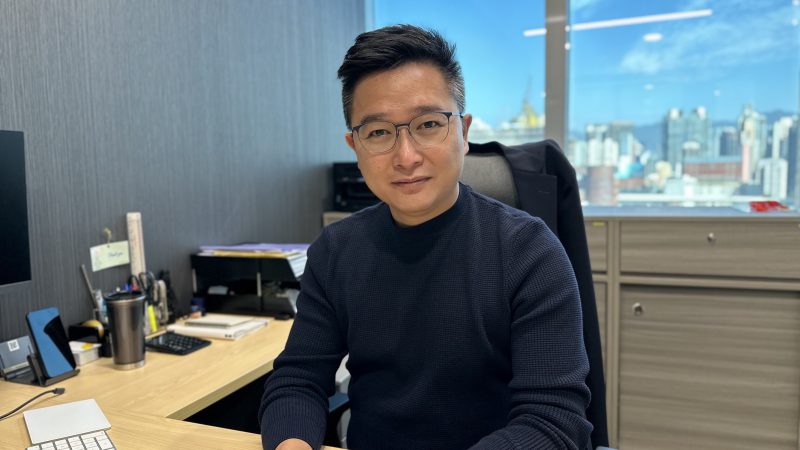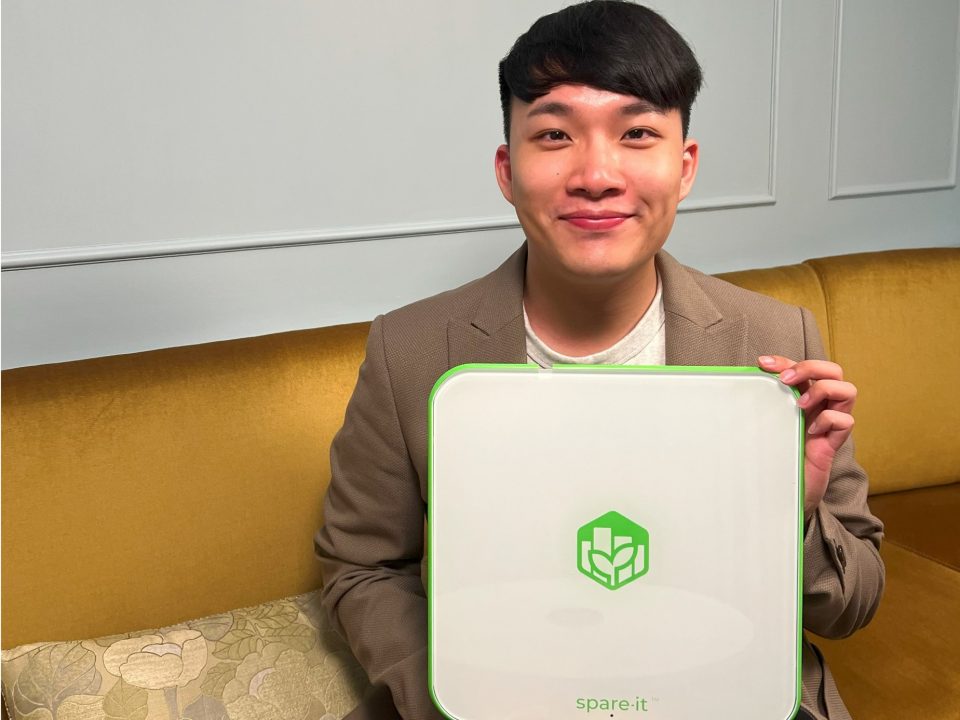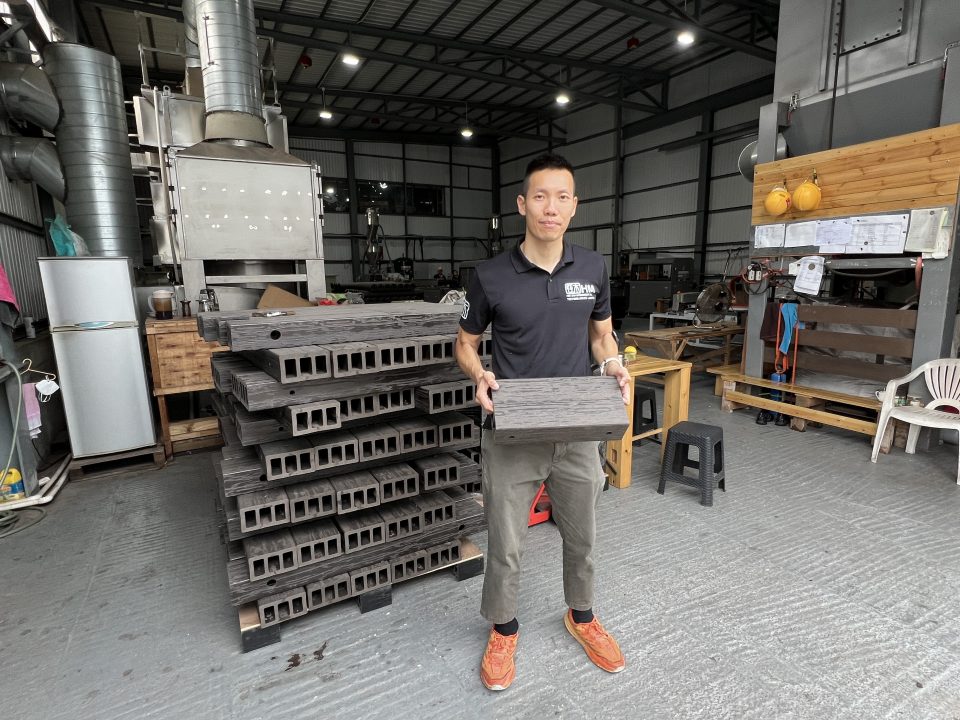
V Cycle: Circular Economy from Responsible Recycling & Love for Community
March 19, 2024
Dress Green: The Green Army in Upcycled Uniforms
June 19, 2024Cornerstone Smart Recycling: Setting the Foundation of Sustainability with Automated Recycling
It’s recycling, rewarding and education in just a light “beep” as you tap your Octopus card. This is RenatureChest, the first reverse vending machine (“RVM”) in Hong Kong, enabled with direct cashback option for every plastic beverage bottle returned via e-payment platform Octopus introduced by Cornerstone early in 2019, or commonly called the “return container machine”. Apart from plastic bottles, RenatureChest also takes two beverage container types at a time – aluminium cans and tetra paks.
Cornerstone is a tech startup, but it could be surprising that its Founder Lawson Lau wasn’t from a green tech background, at all. In fact, Lawson’s academic background and work profile are not related to the environmental protection industry–yet the first company he founded, Cornerstone Technologies, turned out to be a company that develops EV charging system.
“I studied Marketing, and my previous work experience was nowhere close to sustainability or engineering – I merely love cars. I’ve imagined a future filled with autonomous vehicles, and self-driving automobile should all be electrics, so I started paying attention to EV (electric vehicles).” Lawson shared his startup story. “Then one day, a friend of mine who specialises in EV charging and automotive solutions said that the government plans to develop a new generation of EV charging system in the form of public-private cooperation, and asked if I’d like to invest in it. I said yes without hesitation and the rest is history.”
That’s how Lawson resigned and founded his first company, which gradually gained a foothold of sustainability technology innovation.
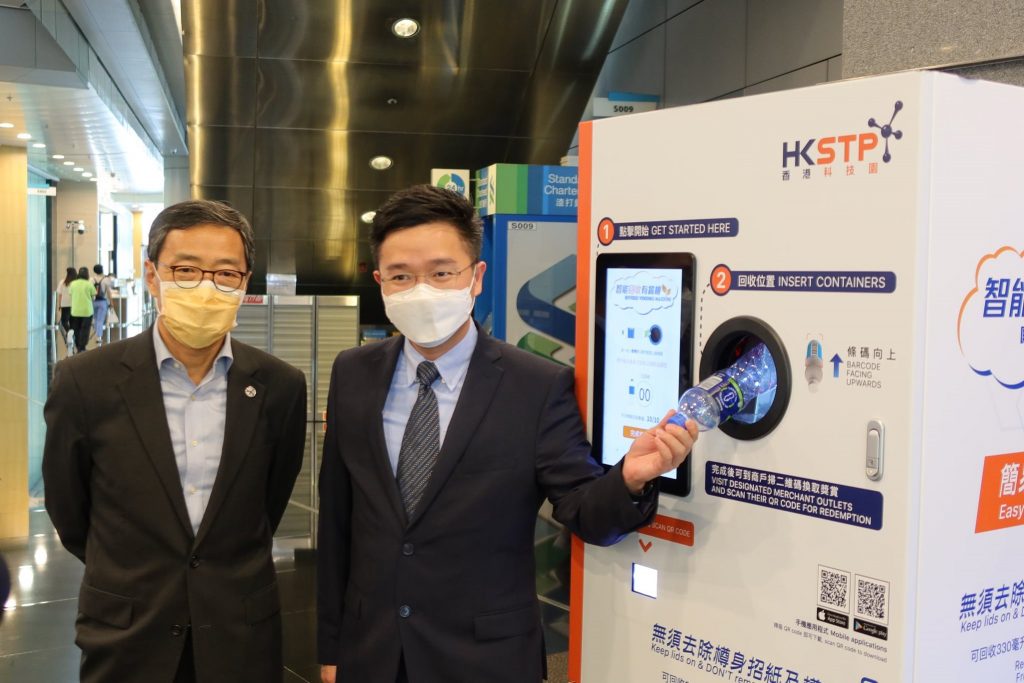
| Cornerstone is the brand founded in 2016 by Lawson Lau. He owns three companies specialising in different business focuses, namely EV-charging solution provider Cornerstone EV Charging Service (Cornerstone Technologies), energy management and second life EV battery energy storage system service provider Cornerstone Energy, and multiple stream smart recycling solution provider Cornerstone Smart Recycling. The brand strives to offer cutting-edge research and development (R&D), solutions and services as a whole in charging systems, recovery of traction battery used in EV, and smart recycling platform, making them more accessible to users in Hong Kong, as well as the clienteles around Southeast Asia who practically cope with the tide of sustainability transformation, engaging stakeholders and the public in building a greener future. In the early days of its establishment, Cornerstone only had 5 engineers, but now it has grown to more than 40, all of whom focus on R&D. In 2019, Cornerstone Smart Recycling (formally known as “Cornerstone Renewable Energy”) launched RVM RenatureChest in Hong Kong, followed by starting off projects related to smart food waste bin SmartClassify in 2020, and the Reusable Container Pilot Programme in collaboration with WWF HK x foodpanda HK in 2022. In October that year, with the launch of the Food Waste Collection Trial Scheme for Public Rental Housing (PRH) Estates introduced by the Environmental Protection Department (EPD), Cornerstone provides SmartClassify across districts in Hong Kong . The latest product from Cornerstone in 2023 – multiple stream smart recycling bins continued to launch in the market, collecting various types of recyclable, including glass bottles, paper, metals, and plastics, in which to encourage the public to reduce waste, separate waste at source, and circulate them in a closed-loop system. |
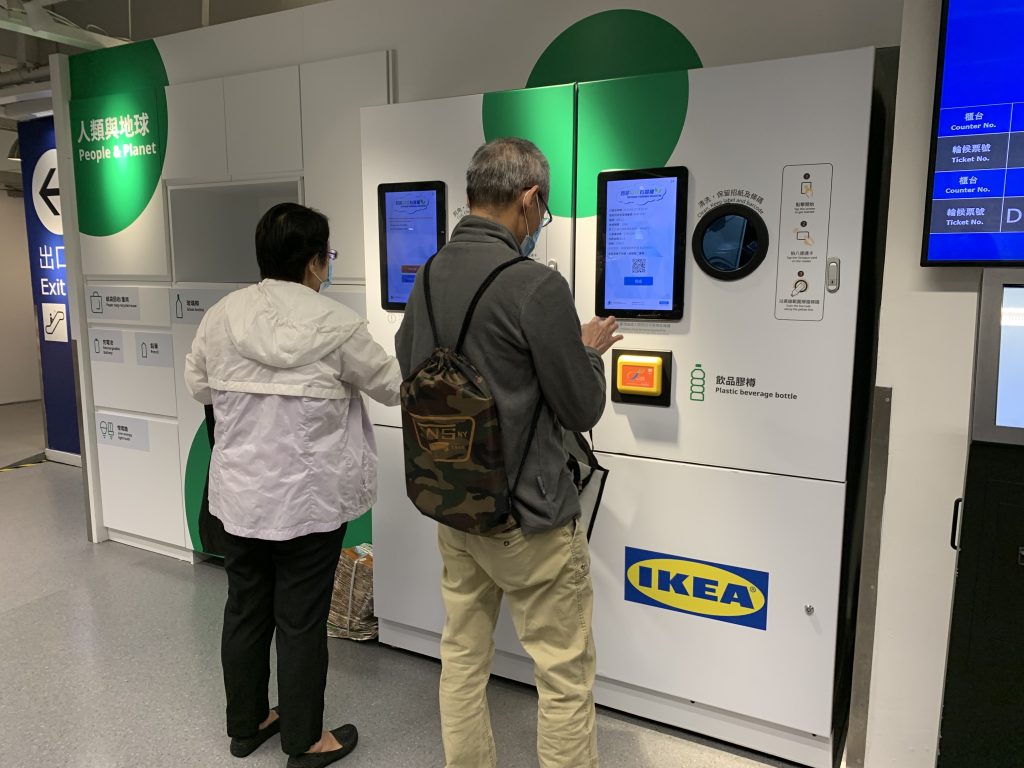
From EV Charger to RVM: Evolve the Business with Market Trends
[Innovation]
In 2016, the electric vehicle and solar PV system markets in Hong Kong were still in their infancy. Nevertheless, Lawson recognised their development potential and made significant investments in these two environmental protection industries. Despite the challenges of high operating costs for land use, construction and manpower, as well as the absence of relevant laws and regulations in Hong Kong, Cornerstone bolstered the scale and capabilities of its R&D team during the development process, thereby establishing a solid foundation for the company’s future success.
At that time, Lawson was unaware of the significance of his decision as he boldly entered into the world of sustainability that comes with a glimmer of hope.
In recent years, the government has been initiating discussion and consultation about regulating waste (including passing the municipal solid waste charging scheme, and the Product Eco-responsibility (Amendment) Bill 2023 for banning the use of disposable plastic tableware and other plastic products). This entails a change in the social norm and market landscape, expected Lawson. “It’s easier to build consensus with all walks of life when every individual shares part of the costs of waste management.” It so happened that he met an NGO (non-governmental organisation) which was finding a vendor of plastic bottle automated recycling machine for a government-funded project. “The fundamental strength that Cornerstone have is R&D; we have talented engineers, and team of hardware, and software development. So we decided to give it a try right away and develop a system and platform other than EV charging – smart recycling solution.”
And here’s where Cornerstone start off its journey in smart recycling. To identify the best solution from the perspective of mechanisation, operating system, and user experience, Lawson scrutinised the resource allocation, considerably from recycling facilities to logistics arrangement, and from waste separation to collection. It resulted in the primitive modelling of the smart container recycling system RenatureChest in Hong Kong, dubbed “return container machine” by the media and users. The RVM adopts advanced technologies and functions. Through its image recognition and artificial intelligence capabilities, it can quickly identify the type of recyclable, such as plastic bottle, aluminium can, tetra pak and so on. The machine also has an automatic sorting feature which can separately collect different recyclables, enhancing the recycling efficiency.
The RVM was praised for making recycling simple: inserting empty plastic drinking bottles, aluminium cans and tetra paks which are commonly used beverage packaging in Hong Kong, the public from there on could choose the incentive options according to the setting from each RVM after recycling, it could be – cash rebate, earn points to exchange for consumer coupons or gifts, or even donate to charity groups, which escalate the usage, engagement and utilisation rate as a consequence. Cornerstone also engaged with business partners by creating cost-efficient and low-carbon emission logistic solutions for waste collection.
Following the initial success of RenatureChest, in 2020, the team took a step further and come up with the smart food waste bin, SmartClassify, which is 100% designed in Hong Kong. This is an innovation that Lawson considered as an essential one to tackle food waste problem in Hong Kong. In 2022, the brand invented a smart recycling bin, which can recycle a wider variety of materials such as glass bottles, metals, paper and other plastics. This new addition provided citizens with an additional convenient recycling channel prior to the official implementation of the garbage levy. As well as tackling the issue of single-use packaging, Cornerstone has also built a takeaway container reuse platform, named TODi Solutions, as a business extension to achieve not only recycling, but also reuse.
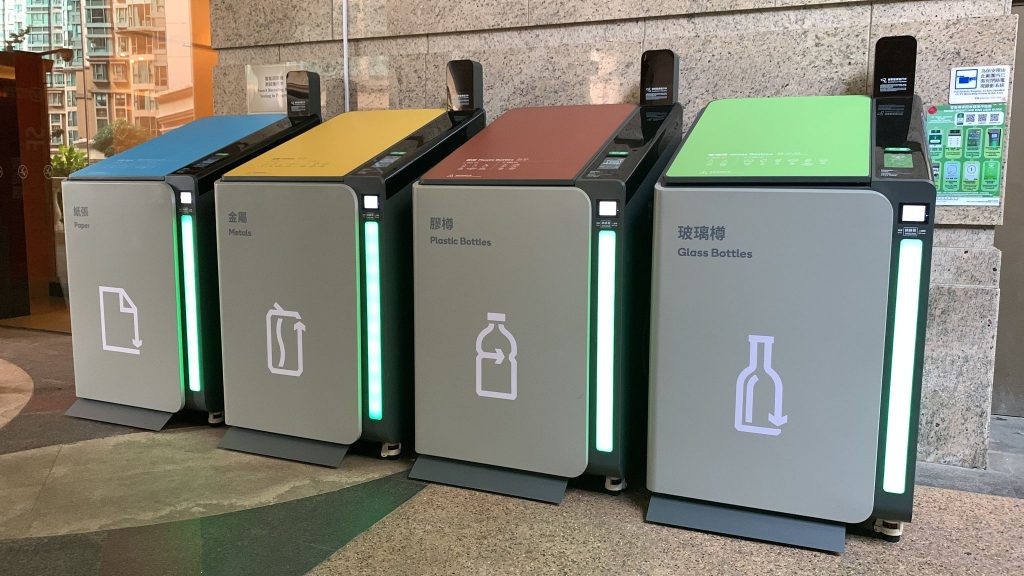
Drive Behaviour Change via Optimisation of User Experience
[Customer Supplier Relationship]
From the above, it is evident that R&D is a significant strength of Cornerstone. The popularity of their products/services among users and customers can be attributed to the team’s meticulous attention to every detail, ensuring that the system genuinely benefits all stakeholders involved. “If we look through the recycling process, hardware-wise, each part of the operation system, from conveyor belt, flipper to compactor, will affect the recycling efficiency. For instance, the logistics cost will increase if plastic bottles aren’t compressed (flat) enough; electrics-wise, the motherboard of control panel has to be customised to fit the operation; sensors should function to automatically identify the size of bottle, scan the barcode or Universal Product Code and validate the bottle, making sure that there is no non-recyclable material or misuse of the system. For the last-mile logistics from the machine to the recycling factory, we’d discuss with the property owner of the machine station and come up with the best way to temporarily store the compressed materials, say, first putting them in a storage room and send them out only when it reaches a certain amount, so as to minimise the cost and carbon emissions.”
Machines are helpful only when there are people using them. To this end, the team has created an engaging operation flow. First of all, the RVM is designed to be a convenient bliss, meaning no queuing for busy Hongkongers. “We’ve also managed to build the incentive platform, using points and redemption system to boost the users’ level of participation. Users would be able to check their points online, and the NGO staff could manage the project online through the platform dashboard.”
And the team’s efforts have been recognised by countless commercial clients, including Ocean Park, Hysan Place, Lee Gardens, The Center, IKEA Hong Kong, Sino and JLL, just to name a few. Tailoring solutions for customers is the key to success, reckoned Lawson. “For corporates, they don’t just rent a machine. For example, I mentioned that we had created a cash-back incentive system, but back in the days when there was no top-up function in Octopus card, we had gone painstakingly through a process of programming and testing to ensure flawless operation. For the redemption programme of Hong Kong Science and Technology Park, where the rewarded points would be used for redeeming dining coupons in the Park, we had to customise for the need and designed a merchant-exclusive app for the F&B outlets.”
Another example was the application of SmartClassify in the Food Waste Collection Trial Scheme for Public Rental Housing (“PRH”) Estates. “Food waste is generally considered filthy and stinky. How can we apply smart technology to increase the usage? How can the smart bin open the lid in a contactless manner, allowing users to dispose of the food waste in few seconds? Considerations such as ergonomics, praxeology, preventing liquid from dripping onto the touchscreen control panel, incorporating motion and light sensors, and implementing deodorisation and sanitisation functions were thoroughly addressed during the R&D stage. After all, EPD has eventually launched a trial scheme in October 2022 to collect food waste using smart bins in public rental housing estates under the Housing Department and the Hong Kong Housing Society. In the first six months of the implementation, more than 40% of residents had managed to use the smart food waste bins, and more than 400 metric tons of food waste had been well-collected. By the end of 2023, the EPD had installed a total of 300 smart food waste recycling bins across 70 public housing estates, collecting a total of about 1830 tonnes of food waste.” The network of food waste recycling is still expanding in scale. As of February 2024, the number of smart food waste bins installed in public housing estates had increased to 435, covering 115 public housing estates, and scope of coverage has been extending to some private estates. Lesson learnt: to drive sustainability, it’s important to excel in one specific aspect (say, innovation for Cornerstone); still, the capability to offer “the best” solutions to your clients remains the key to success.
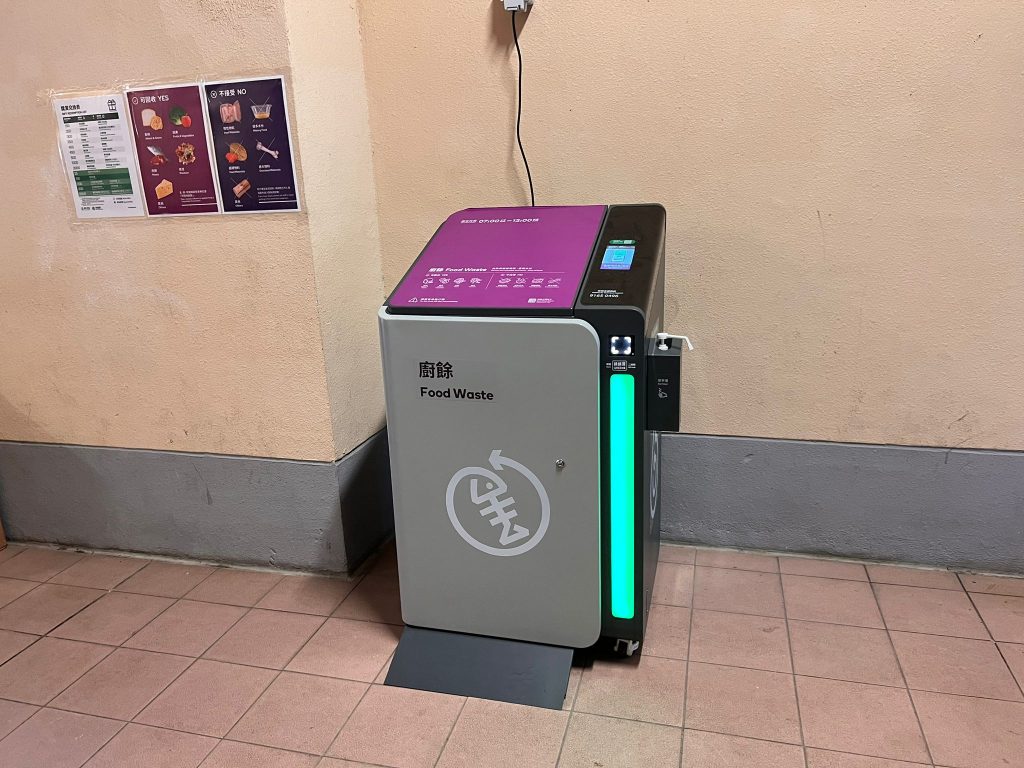
Cornerstone Smart Recycling was one of the invited speakers at the two workshops titled “ Practicing Resource Circularity in the Foodservice Industry” held in November 2023 under the Partnership for Sustainability Leadership in Business (PSLB). The PSLB project is initiated by the Centre for Civil Society and Governance, The University of Hong Kong, and supported by The Hongkong Bank Foundation. It is aimed at fostering sustainability leadership and collaboration in the business sector of Hong Kong through knowledge transfer, capacity building, and network development; in particular, the project strives to foster strong partnerships between big corporations and small and medium-sized enterprises (SMEs) in pursuit of sustainability.



